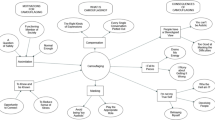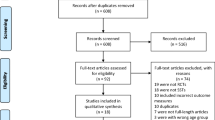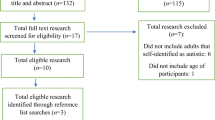Abstract
This article examines the impact of sensorimotor deficiencies on social and emotional development in childhood. Children who have impairments in processing and coordinating sensory experience are unable to sufficiently develop sensorimotor schemas. Sensorimotor learning, in part, creates the experimential domain of the emergent self and is also a necessary component of core self development as outlined by Daniel Stern. The impact of deficiencies on the core self and, therefore, on social and emotional development are demonstrated with a complicated case example. The treatment process highlights the possibility of reworking core self issues and their effects on self concept and relationships. Multidisciplinary treatment is required to fully address all deficits. The child psychotherapist's role is to attend to the emotional and relational issues, as well as to coordinate the work with family and school.
Similar content being viewed by others
References
Ayres, J. (1979).Sensory integration and the child. Los Angeles: Western Psychological Services.
Bower, B. (1996). Whole-brain interpreter: A cognitive neuroscientist seeks to make theoretical headway among split brains.Science News 149, pp. 124–125.
Daehler, M. & Bukatko, D. (1985).Cognitive development. New York: Alfred A. Knopf.
Palombo, J. (1991). Neurocognitive difference, self-cohesion, and incoherent self-narratives.Child and Adolescent Social Work, 8(6), 449–472.
Palombo, J. (1995). The effects of nonverbal learning disabilities on children's development: theoretical and diagnostic considerations. In (B.S. Mark & J. Incorvaia, eds.)The handbook of infant, child, and adolescent psychotherapy: a guide to diagnosis and treatment. New Jersey: Jason Aronson Press.
Palombo, J. and Berenberg, A. (in press). The psychotherapy of children with nonverbal learning disorders. In B.S. Mark & J. Incorvaia, (eds.)The handbook of infant, child, and adolescent psychotherapy. Volume 2. New Jersey: Jason Aronson, Inc.
Rosenberger, J. (1988). Self psychology as a theortical base for understanding the impact of learning disabilities.Child and Adolescent Social Work, 5(4), 269–280.
Rourke, B., Fisk, J., & Strang, J. (1986).Neuropsychological Assessment of Children, New York: The Guliford Press.
Silver, L. (1992).Attention-Deficit Hyperactivity Disorder: A Clinical Guide to Diagnosis and Treatment. Washington D.C.: American Psychiatric Press.
Stern, D. (1985).The Interpersonal World of the Infant. New York: Basic Books.
Taylor, S.S. (1991). Sorting out within a “troika”: treatment of neurologically based learning disabilities in children.Child and Adolescent Social Work 8(6)501–513.
Author information
Authors and Affiliations
Additional information
is on the editorial board of theClinical Social Work Journal, is on the faculty of the Institute for Clinical Social Work, and is in private practice.
Rights and permissions
About this article
Cite this article
Eldridge, A. Lost in space: The impact of sensorimotor difficulties on emotional and social development in early childhood. Child Adolesc Soc Work J 13, 333–346 (1996). https://doi.org/10.1007/BF01875912
Issue Date:
DOI: https://doi.org/10.1007/BF01875912




